Yaraslau Bekish: We want to stir up green movement in Homel region
 Pripyat National Park, belarus.by
Pripyat National Park, belarus.by
The maximum program of the “Green Forum” is to create a network of the organizations, which would be able to set and resolve ecologic tasks at short notice.
On July 19 “Green Forum” took place in Homel. “Green Network” society and “Centre for the regional development of Gomel Democratic Forum” are the organizers of the Forum.
Social organizations, representatives of state bodies, and ecological activists discussed the most actual ecologic challenges of the Homel region. The dialog resulted in elaboration of common vision for development of green movement in Homel region, as well as agreement on common goals and methods of collaboration.
Yaraslau Bekish, the Coordinator of the ecological association “Green network”, told “EuroBelarus” Information Service about the characteristics of the “Green Forum”, its goals and tasks.
- Why was Homel region chosen as a place for conduction of the “Green Forum”?
- We are working by the following principle: when an ecologic initiative appears in the region, we are helping to fulfill it. We are planning to hold an analogous Forum in Hrodna in September.
Besides, Homel Democratic Forum is working in Homel, and though it isn’t an ecologic organization, for a long time it has been working to support civic activity. Homel Democratic Forum is a partner of the “Green Network”, which is a serious factor for activation of our work in the region.
We invite the representatives of social organizations and initiatives, as well as the representatives of Homel regional Natural Resources and Environmental Protection Committee to participate in the “Green Forum” hoping that they will also be present at the Forum.
- What are the ecologic challenges that the Homel region is facing?
- These are the challenges defined by the Homel ecologic activists, who are, actually, numerous. The first and foremost challenge is the consequences of the Chernobyl disaster: purity of food and building materials, the return of contaminated land previously derived from crop rotation back into agricultural use.
The rest of the problems are typical of the whole country: air pollution in cities, preservation of green space along roads and in the cities, the problem of increased content of phosphates in water bodies. Homel region is running a campaign for the preservation of Pripyat oak woods (Pripyat National Park).
It is not ecologic challenges that are important for the “Green Network” in the Forum, but social ones. We are trying to understand whether citizens of Belarusan regions are able to regard ecologic challenges in the region as their personal challenges? Over the last time social activity in the regions has considerably quieted down, though there are some opposite examples in Svetlagorsk, Turau, and Homel.
- Which aims and goals did the Forum have?
- We have a maximum program and a minimum program.
The latter one is to organize a meeting for us, help our activists meet each other, and, if possible, agree on the first steps and elaborate the common vision of fight against the ecologic problems. We would like to form a core for the future Homel green movement.
Our maximum program in Homel is to form something that could be called a green network: a network of interconnected organizations, which would also be linked to the state authorities and business; organizations, which would be able to set and resolve ecologic tasks at short notice. This task, definitely, can’t be resolved within the work of one meeting; it is rather a long-term goal.
In simple words, we want to stir up green movement in Homel region.
-
03.01
-
07.10
-
22.09
-
17.08
-
12.08
-
30.09



























